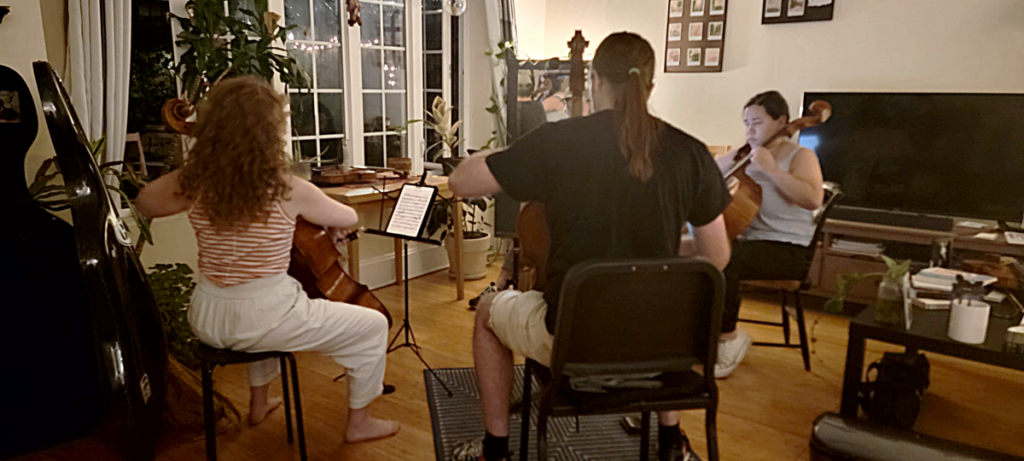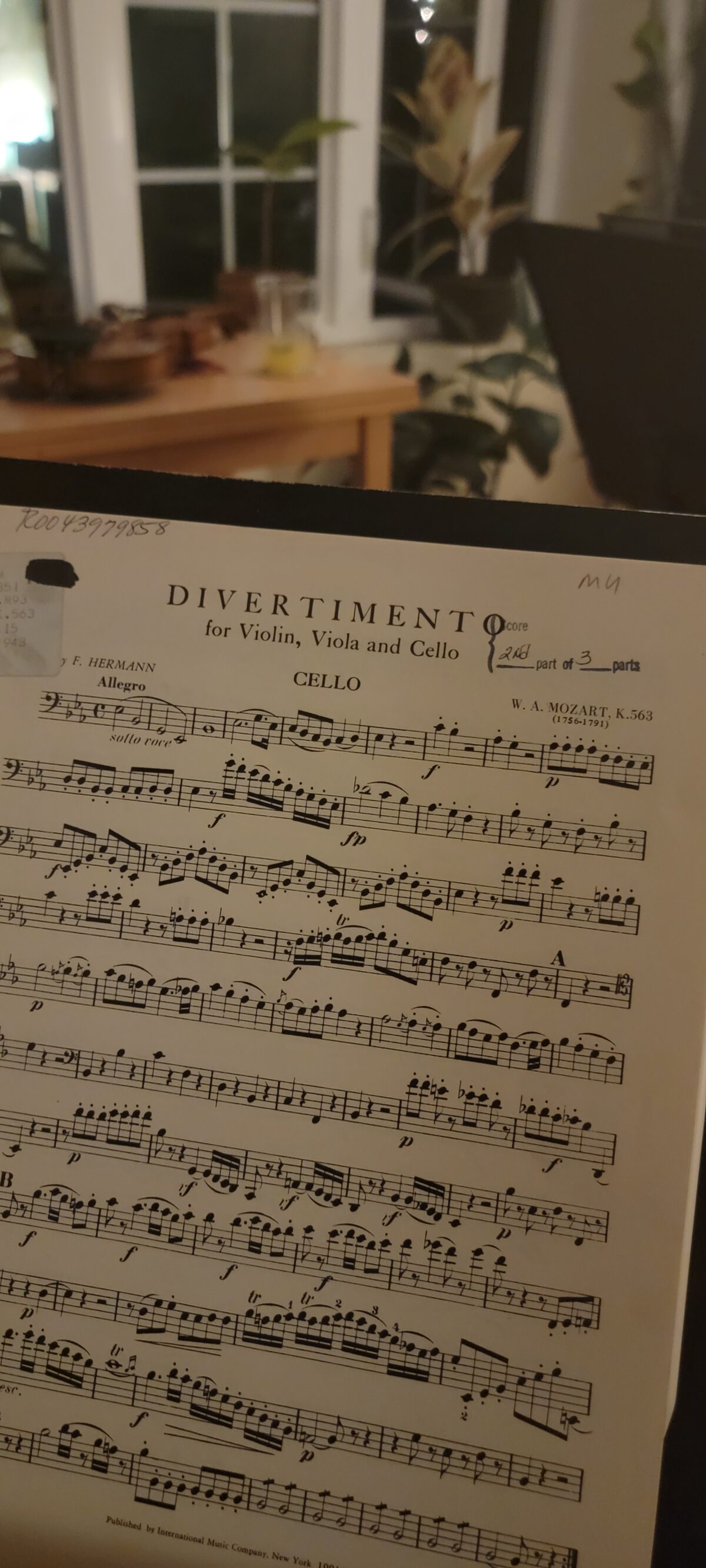It’s a warm Friday night in July, and Everardo Sánchez and Alejandra Switala are setting the scene. They’re laying out a charcuterie board, filling a cooler with La Croix in the backyard, and putting out the final touches on what is to be their stage for the night—a basement apartment with acoustically convenient windows that allow sound to drift into passersby’s ears. There is a personalized cello case and a book about Pablo Casals on the coffee table. In the backyard, they’re prepping a fire pit and benches to surround it. This is definitely a musician’s apartment. Sánchez and Switala are setting up the place for what is to be Pilsen Classical’s first performance of 2023.
If you’ve walked the streets of Pilsen over the past few years, you may have heard ethereal music wafting out of various homes. When it’s not house music, corridos, or Bad Bunny, it’s the music of Mozart, Brahms, and Beethoven, and it’s happening live. While Chicago’s summer festival season is in full swing and one has a plethora of genres to choose from—Chicago House Music Fest, Beyoncé, Lollapalooza—Pilsen Classical offers a welcome respite from the highly technical and commercialized venues.
While Sánchez and Switala set up the apartment, their fellow performers—versatile violinists, violists, cellists—and audience start to trickle in. Once their home reaches critical mass, about ten people, they begin to play. They start with Mozart’s “Divertimento,” a trio written by the virtuoso composer in 1788. The three begin to play. It’s immediately obvious that these are not amateurs, and made all the more impressive by the fact that none of these performers knew what pieces they would play before they arrived.
This is the conceit of what they’re doing this summer, and the organic culmination of the training and friendship of Amelia de Rudder, Switala, and Sánchez. Part Tiny Desk performance, part dress rehearsal, part musical chairs, it was borne out of the need for community in the wake of the pandemic’s distancing recommendations.
Their first concert was in 2020. “It happened by accident, this whole thing,” Sánchez said, “but the more and more we talked about it, the more and more it became such a passion project that the mission is to return to music as a communal practice.”
A Pilsen institution unto herself, de Rudder was the catalyst for creating the group. A resident of Pilsen for over twenty years with a myriad of other artistic endeavors (including a long-running, deeply immersive haunted house, La Casa de Satanás, that requires a liability waiver), she encouraged the group to create an Instagram page and curated the vibe of Pilsen Classical’s sight-reading performances. “She really helps us create, like, a magical atmosphere. I’ve never experienced anything like this before, even for performers,” Switala said.
The origins of the group predate Switala’s and Sánchez’s history in Chicago. Switala came from a musical family (her brother is a violist) and began playing the violin when she was four in Grapevine, Texas. Sánchez grew up in El Paso, Texas and originally started playing the flute before switching to string instruments when he saw his sister playing the violin. They have connections to one another’s Texas towns and were even taught by the same teacher.
Somewhere between the “Divertimento”’s second and third movements, the crowd begins to swell as more people with their sticker-garbed string-instrument cases arrive and sit to listen and have a drink. By this point, the audience has grown into about thirty people standing shoulder to shoulder. After the trio finishes the piece and the crowd settles, Switala picks through her stack of sheet music and assesses who can play. They decide on Beethoven’s “Trio #4,” again performed by a violinist, violist, and cellist.

There is no shortage of musicians to choose from at this event. All the performers who are here to play are professional musicians. Some are graduate students at DePaul University’s conservatory; others play for the Milwaukee Symphony; some are teachers.
“They have albums out, some of them are producers, some of them cover a lot of different facets of the music industry,” Switala said. “Just a ton of experience that these players have that come that want to have a good time, but also want to make great music.”
As a self-described “chaotic” event, it is an example of the performer’s mantra that the show must go on. After David Popper’s “Requiem” (a cello trio), the next couple of pieces were adapted to be played by who was available. “The Hymn of the Cherubim (or Cherubikon)” was written by Pyotr Tchaikovsky to be sung as a choir and was performed in Eve’s apartment as a four-cello quartet arranged by Calvin, one of the cellists. A quartet by Maurice Ravel, originally written for two violins, a viola, and a cello, was performed by a violin, two violas, and a cello.
The anarchic nature is a fitting dethronement of classical music as a hobby of the affluent, and a purposeful departure from the strict, conservative, and sterile structure that classical music halls are known for. “Even [when] it comes down to dress codes. The dress code in every orchestra I’ve played, in the Midwest, especially, it’s very conservative, very strict dress codes,” Switala said. “A lot of them don’t allow tops that don’t go above the elbow, you have to wear stockings, you can’t show your ankles, it just feels really stifling.”
The audience is encouraged to participate, walk around, and mingle. There’s no cost to attend the events and the capacity is determined by the venue, which is usually someone’s apartment.
Because it is an impromptu event and in keeping with the sporadic character of the events, the best way to find out their next gathering is to turn on their story notifications on Instagram.
“The funny thing about it is that people are like, ‘You should do this regularly,’ and I’m like, ‘No,’ because that’s boring,” Switala said. “It is kind of exciting when [we decide], ‘You know what, this is a good weekend. Let’s do it during the Pitchfork/Beyoncé weekend, because the people that aren’t going to those need something to do also.’”
Francisco Ramírez Pinedo is a freelance journalist and web developer based in the Southeast Side.


This sounds like fun!
I don’t do Instagram or other social media, though. So how can I find out about the next concert? E-mail?
Please share my email with the musicians so that we can be in touch!
Ilona Gersh
Igersh@fastmail.com